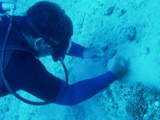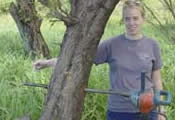Project Highlights:
- Greenhouse study and pilot-scale field demonstration
- Innovative remediation that could be transferred to other Pacific Island ecosystems
- Collaboration with high schools and the local community throughout all stages of the project
Project Description:
For 60 years, explosive ordnance waste was thermally treated in the Open Burn/Open Detonation (OB/OD) unit at Makua Military Reservation. As a result the soil at this former OB/OD unit contained residual levels of lead, Octahydro-1,3,5,7-Tetranitro-1,3,5,7-Tetrazocine (HMX), Dinitrotoluene (DNT), and Hexahydro-1,3,5-Trinitro-1,3,5-Triazine (RDX). The objective of this study was to determine the effectiveness of plants unique to the Asia-Pacific region to phytoaccumulate and phytodegrade contamination, including organic nitrogen, organic phosphorus compounds, and heavy metals from former OB/OD operations.
Several promising and useful findings which may lead to even more valuable determinations in the future resulted from the study. During a 3-month greenhouse study conducted at the University of Hawaii, 12 plant species (8 native and 4 non-native) demonstrated the ability to reduce energetic compounds in site soils. The dominant Guinea Grass species present within the OB/OD unit appeared to have reduced the concentration of RDX and HMX, more so than 11 other plant species. At the OB/OD site, composite sampling verified that the energetic compound DNT is heterogeneously distributed within the soil matrix in the form of small nuggets of different sizes.
Other work at Makua Valley involved measuring nutrient and metal content in individual tree rings revealing conditions such as soil, water, or air composition during the time the tree rings were formed. Environet used this bio-monitoring technique to assess the cumulative environmental impact caused by military use of the valley.
As phytoremediation research continues in Pacific Island ecosystems, better ways are being discovered to treat areas affected by explosive ordnance waste. Environet anticipates that the results of the research from this project may be applied at other regional locations with a similar need, such as the former Navy weapons range on island of Kahoolawe.






